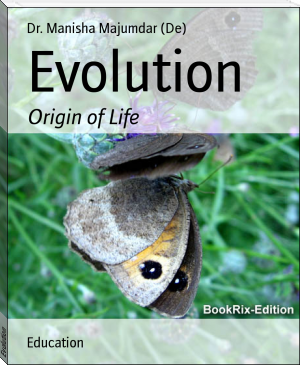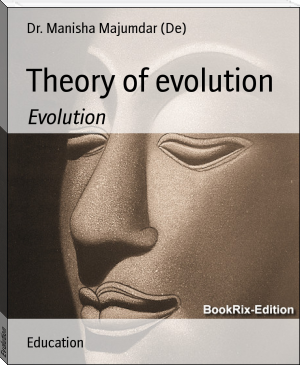Freedom in Science and Teaching by Ernst Haeckel, T. H. Huxley (free ebook reader for pc .TXT) 📖

- Author: Ernst Haeckel, T. H. Huxley
Book online «Freedom in Science and Teaching by Ernst Haeckel, T. H. Huxley (free ebook reader for pc .TXT) 📖». Author Ernst Haeckel, T. H. Huxley
The light way in which Du Bois-Reymond here passes over the most important part of his subject is truly surprising; as if it were ultimately indifferent whether we have before us one single insoluble fundamental problem or two quite different ones; and as if mature reflection did not lead to the conviction that, in fact, the second problem is only a special case of the first general problem. I, for my part, cannot conceive of them in any other relation; I think, too, that all further words are by no means superfluous, but on the contrary conduce to a very strong conviction of the unity of the problem. That Du Bois-Reymond also has not come to any clear conclusion on this point lies, not alone in the "nature of things," but, as in Virchow's case, in the nature of the investigator himself; in his lack of knowledge of the history of evolution, and in his neglect of those comparative and genetic methods of study, without which, in my opinion, not even an approximate solution of this highest and most difficult question is to be looked for.
Nothing appears to me to be of more importance for the mechanical explanation of consciousness than the comparative consideration of its development. We know that a new-born child has no consciousness, but that it is slowly and gradually acquired and developed. We perceive for ourselves how unconscious actions become conscious, and vice versa. Innumerable actions which at first are troublesome and have to be learnt with consciousness and reflection--as for instance walking, swimming, singing, and so forth--become unconscious only by repetition, practice, and the habit of using the organs. On the contrary, unconscious actions become conscious as soon as we direct our attention to them or our self-observation is attracted to them; as for instance when we miss a step in going up stairs or touch a wrong note on the piano; and beyond a doubt, conscious and unconscious actions pass into each other without any distinct line of demarcation. Finally, we see no less plainly by a comparative consideration of the soul-life of animals, that their consciousness is slowly, gradually, and serially developed, and that a long unbroken series of steps leads from unconscious to conscious existence. From these comparative and genetic experiences we may draw the conclusion that consciousness, like sensation and volition, like all the other soul-activities, is a function of the organism, a mechanical activity of the cells; and, as such, is referable to chemical and physical processes. Hence, if we were in a position to understand force as a necessary function of matter, we could explain consciousness, as well as the soul in general, as a necessary function of certain cells.
How little Du Bois-Reymond is acquainted with the facts of comparative and genetic psychology, nothing shows more strikingly than the following astounding proposition in the "Ignorabimus-speech:"--"Where the material conditions for psychical activity, in the form of a nervous system, are wanting, as in plants, the naturalist cannot recognise a soul-life, and, on this point, he but seldom meets with contradiction." Begging your pardon! Every naturalist who is familiar with the comparative morphology and physiology of the lower animals will here put in a decided contradiction, for he can no more refuse to admit the undoubted sensation and voluntary motion of the one-celled Infusoria than of the many-celled hydroid polyps. The body of the true Infusoria (Ciliata, Acineta, &c.), and many other Protista, remain throughout life one single cell, and, nevertheless, this cell is as fully furnished with all the most important attributes of the soul, with sensation and volition, as any one of the higher animals with a nervous system. The same obtains of the Hydra and the related hydroid polyps, in which the neuro-muscular cells, or other distributed cells of the outer germ-layer, fulfil the soul-functions. But as these cells, besides this, exercise motor and other functions as well, we cannot as yet designate them as nerve-cells, at any rate there can be no idea of a special nervous-system. The characteristic soul-organs of the higher animals, which we include under the conception of a nervous-system, in fact originated by the division of labour of the cells out of those neutral cell-groups in their lower-typed ancestors.
In the great Soul-question Du Bois-Reymond, like Virchow, still keeps his position on the standpoint of neural-psychology, according to which no personal soul-life is conceivable without a nervous system. We look upon this standpoint as left far behind, and set up in opposition to it Cellular-psychology, the doctrine that every animal cell has a soul; that is to say, that its protoplasm is endowed with sensation and motion. In the one-celled Infusoria, which are so highly sensitive and have such an energetic will, this conception will be clear without any farther explanation. But we cannot refuse to allow that plant-cells as well as animal-cells have psychic functions, since we know that the phenomena of irritability, and of "automatic motion," are the universal attributes of all protoplasm. No doubt the specific mechanism, the cause of motion, in the irritable Mimosa and other "sensitive" plants, is quite different from the muscular motions of animals; but these, like those, are only specifically different forms of development of the "cell-soul," and both proceed from the "mechanical energy of the protoplasm." The sensibility of the irritable protoplasm is the same in the vegetable-cell of the Mimosa as in the animal-cell of the Hydra. How far Du Bois-Reymond is from discerning this, and how deeply he is still entangled in neuro-psychological views is shown most clearly in the astonishing sentence which he has thought good to append to his above-quoted, erroneous assertion. "And what could we reply to the naturalist if, before he could agree to the assumption of a World-soul he required that we should show him--bedded in neuroglia and nourished by warm arterial blood--anywhere in the world a convolution of ganglionic centres co-extensive with the psychic capacity of such a Soul" (!)
In other respects we will not deny that Du Bois-Reymond stands far nearer to our recent evolution-theory than Virchow; nay, that from year to year he has always pronounced more and more emphatically in favour of the theory of descent as the one possible explanation of morphological phenomena; indeed, Du Bois-Reymond has lately counted himself as one of those naturalists who were convinced of the truth of evolution even before Darwin! Then it is only to be wondered why so acute and gifted an inquirer, who is certainly not lacking in scientific ambition, left it to Charles Darwin to place the egg of Columbus on the ring and to point out to biological science a new method of unlimited capacity by giving the theory of descent a definite and reliable basis!
It is clear from some remarks in his discourse bearing the title "Darwin versus Galiani" (1876), that Du Bois-Reymond is still far from understanding the full significance of transmutation as affording a mechanical explanation of morphological problems. In this paper the "History of Creation" is treated simply as a romance, and the genealogies of phylogenesis are in his eyes "of about as much value as the pedigrees of the Homeric heroes are in the eyes of historical critics." Geologists may be extremely grateful for this estimate of their science, for undoubtedly geology, as a structure of hypotheses, is neither more nor less justifiable than phylogenesis, as I have already pointed out in my Munich address: "Our phylogenetic hypotheses may claim to have equal value with the universally-admitted hypotheses of geology; the only difference is this, that the mighty structure of hypotheses called geology is incomparably more complete, simpler, and easier to grasp than that more youthful one called phylogenesis." But as to the much-talked-of "genealogies," though they are nothing more than the simplest, barest, and most superficial expression of the hypotheses of phylogenesis, as provisional hypotheses they are just as indispensable to specific phylogenesis as the theoretical section-tables of the strata of the earth's crust are to geology.
If Du Bois-Reymond is so convinced of the truth of transmutation as he has lately given himself out to be, why does not he make at least one earnest attempt to test the interpreting power of the theory of descent in physiology--his own most special province of inquiry? Why does he not labour at that hitherto quite unworked-out branch, physiogenesis, at the history of the evolution of functions, at the ontogenesis and phylogenesis of vital processes? The one idea which has lately been often spoken of as an important discovery of Du Bois-Reymond's--[the idea which had already been anticipated by Leibnitz, that the "innate ideas,"--intuitions à priori--have originated by transmission from primordial experience, i.e., empirical, à posteriori convictions], was distinctly enunciated by me long before Du Bois-Reymond (as he omits to mention), in 1866, in my "General Morphology" (vol. ii. p. 446), and in 1868 in the "History of Creation" (vol. i. p.
 The desire to acquire knowledge about the surrounding world and human society is quite natural and understandable for a person. Life is so developed that an uneducated person will never occupy a high position in any field. Humanity in its mass, and each person individually, develops objectively, regardless of certain life circumstances and obstacles, but with different intensity. The speed of development depends on the quality of training.
The desire to acquire knowledge about the surrounding world and human society is quite natural and understandable for a person. Life is so developed that an uneducated person will never occupy a high position in any field. Humanity in its mass, and each person individually, develops objectively, regardless of certain life circumstances and obstacles, but with different intensity. The speed of development depends on the quality of training.




Comments (0)